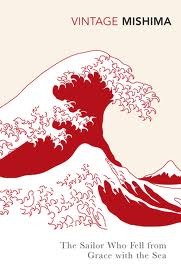 My rating: 2.5 of 5 stars
My rating: 2.5 of 5 stars
A disturbing tale of youth corrupted. Mishima crafted a vivid portrait of post-war Japan and mind of a child growing up in the shadow of a charismatic and dangerous peer.
“…living is merely the chaos of existence…”
The protagonist Noboru is 13 year old and part of a gang of youths led by The Chief, a disturbing and rather psychopathic fellow 13 year old. The Chief gives the other boys sermons on rejecting the adult world as an illusion filled with all things hypocritical and sentimental. He schools them in removing all traces of emotion and challenges their loyalty. The whole set up of this group is very disturbing and seeing it from inside NoBoru’s head as he takes these messages on board as truth made my skin crawl.
“There’s a huge seal called ‘impossibility’ pasted all over this world. And don’t ever forget that we’re the only ones who can tear it off once and for all.”
The central tension of the novel is caused by his widowed mother’s relationship with a ship’s officer. Noboru witnesses the beginning of their relationship through a peep-hole he had discovered in his room – and through which he had been dispassionately watching his mother undress on many other occasions. This whole mother-son dynamic is not at all explored but is as disturbing as you can imagine.
Noboru’s mother’s lover and his connection to the sea and to Noboru is the thread that the whole story is woven around. There are some really beautiful passage about the mournful nature of the sea and about the longing or conflict that sailors experience. I really appreciate the skill with which Mishima wrote, even when the subject matter wasn’t something that I could really engage with.
“Possibly a man who hates the land should dwell on shore forever. Alienation and the long voyages at sea will compel him once again to dream of it, torment him with the absurdity of longing for something that he loathes.”
I can’t bring myself to rate this rather disturbing book any higher, and it feels so far distant from the haunting but beautiful ‘The Sounds of Waves’ which I enjoyed so much. After learning more about Mishima and his political views, including the events that surrounded his death by ritual suicide I’m not sure if I will pick up any more of his work in the future.
Trigger warnings: Animal cruelty and graphic animal death, planning/discussion of premeditated murder.

I thought it was a masterpiece. Beautiful prose, and, yes, disturbing themes. But the allegorical level on which it works in regards to pre and post war Japan, along with different conceptualisations of masculinity/what it means to be a man at different points in one’s life was masterful. Rating a book 2.5 for disagreeing with an author’s politics and philosophy, along with uncomfortable scenes, seems a bit of a shame. Surely we can appreciate art even if we dislike/disagree with the author, even if the experience makes us uncomfortable – perhaps especially in that case.
I agree entirely, it’s one of those novels I can’t get out of my head.